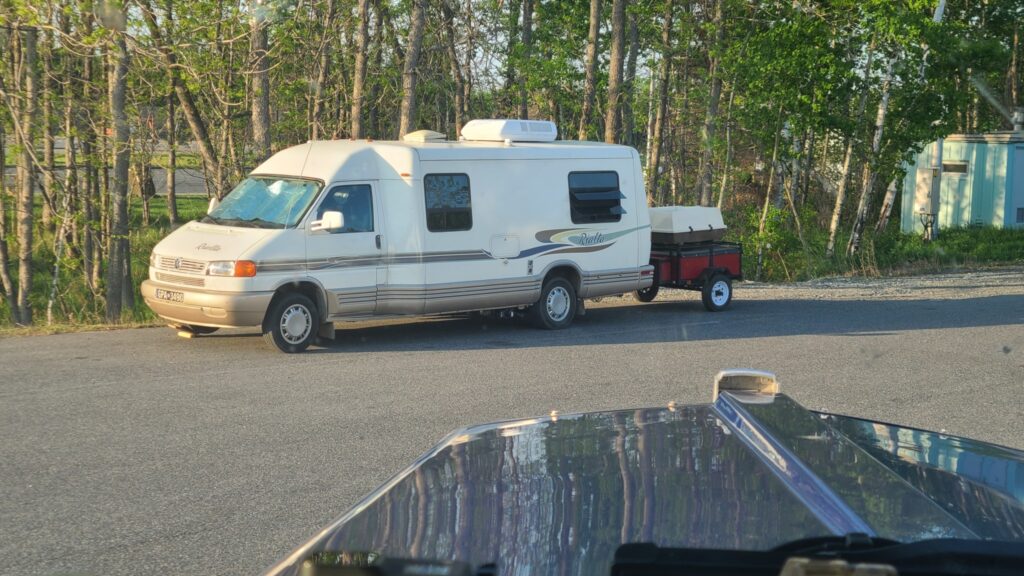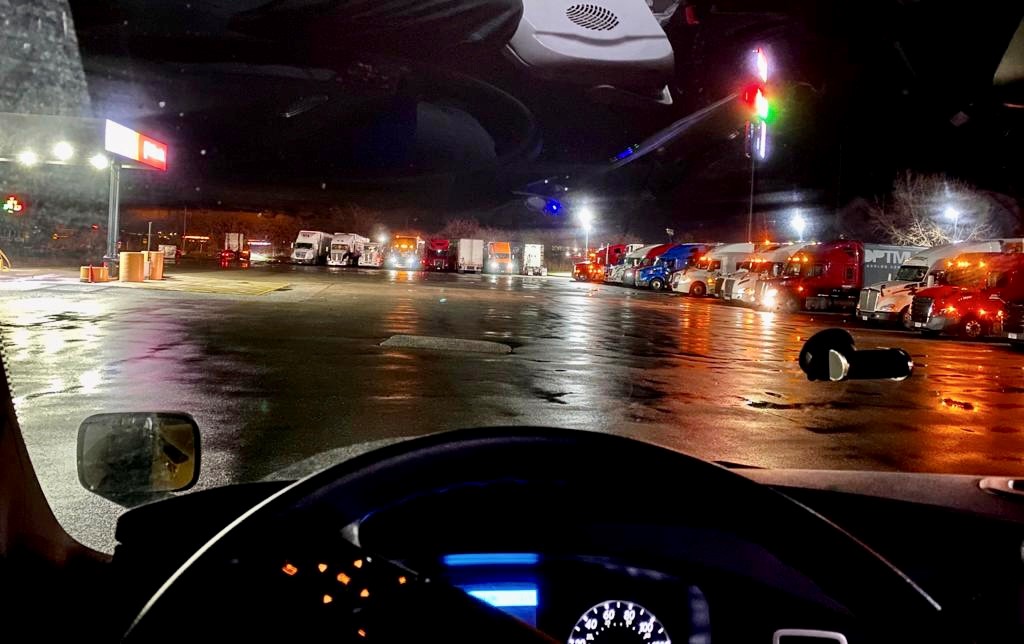Van life, RVs put the squeeze on truck parking
A growing trend in van life — combined with summer vacationers at the wheels of recreational vehicles (RVs) and campers — is adding to the struggles of truck drivers who are already competing for limited parking spaces in rest areas and truck stops.
Manitoba owner-operator Joshua Giesbrecht, known as Trucker Josh on YouTube and other social media channels, says the situation leaves him frustrated.
“We don’t have a choice we have to stop. They can go a little further and find a spot if they have to. Maybe they are unaware of the parking situation for us. They don’t have to stop legally,” Giesbrecht says, referring to Hours of Service rules. “It is frustrating when people on vacation take up a spot.”

Compounding challenges, Giesbrecht says recreational vehicles and campers with trailers are grouped with commercial vehicles at rest areas. “It would be nice if that could be changed to commercial trucks only. Get the RVs to park somewhere else,” he says.
Driver Lee Wood underscores the issue. “It’s not marked as ‘truck parking only’. It’s a free for all, and that is half the problem,” the veteran trucker says.
Campers taking two or three spots
Wood says the Pine Grove rest area outside Reynolds, Man., is full of RVs this time of the year until the weather turns colder. “You might [get] two trucks in there because there might be 10 campers in there, or people sleeping in their cars.”
He adds that the problem also sometimes spills into truck stops. Campers will open their trailer canopies and take up two spots. Sometimes they park their vehicles in a third spot. “So now, one guy with a 25-foot trailer is taking up three spots. If there’s three of them, that’s nine spots. There’s nine truck drivers that don’t get to park.”
Leah Gorham, a New Brunswick owner-operator who drives as part of a team for an Ontario carrier, says she sees RVs parked all the time at ONroute rest areas. The Barrie location on Hwy. 400 north of Toronto, and the Cambridge and Port Hope locations along Hwy. 401, are among the worst.
“We can’t even stop to use the bathroom.”
Leah Gorham, truck driver
“It is bad after 6 p.m. as people in RVs and vehicles with trailers pull into truck parking spots. We can’t even stop to use the bathroom,” Gorham says. If there are towels and clothes hanging from windows, they most probably have been there awhile, she adds.

The problem is exacerbated on the West Coast, where the housing crisis has forced people to live in vehicles and occupy truck parking spots for months at a time.
A recent CTV News report indicated that provincial rest stops have become makeshift RV parks and encampments, creating a safety hazard for drivers in B.C.
The Bradner rest area, the last major rest stop for truckers before Metro Vancouver, is in the spotlight as dozens of vehicles have been camped in parking spots for months.
Longer-term camping not permitted
The B.C. Ministry of Transportation and Infrastructure told TruckNews.com it is aware of people using some public highway rest areas for longer-term camping. While overnight rest for travelers is permitted, longer-term camping is not permitted.
The ministry said it “continues to work with Ministry of Housing though their outreach program and with local enforcement to keep the current rest area a safe place to temporarily stop and use the facilities. The ministry has also been working closely with the City of Abbotsford, sharing relevant information, concerns and decisions that relate to the Bradner rest area.”
Dave Earle, president and CEO of B.C. Trucking Association (BCTA), says the several dozens of “residents” at the Bradner rest area are either homeless, displaced people or recreational campers. The site has hot and cold running water and free Wi-Fi.
Seeking solutions in B.C.
The BCTA has met with ministry officials and is calling on the province and municipalities to act.
“How do we address the needs of those using these facilities improperly? There’s no simple solution,” Earle said.
The B.C. Ministry of Transportation and Infrastructure recently announced it is prioritizing improvements at rest areas through a new $100-million Safety Rest Area Improvement Program over the next nine years. Of that, $28 million will be spent over the next three years to support the trucking industry and other travelers. The ministry is also exploring upgrades to the Bradner rest area.
Truck drivers who must deal with this throughout the country on a daily basis are left wondering if there will ever be a solution.
“Whose responsibility is it to make sure I have somewhere to stop?”
Joshua Giesbrecht, truck driver
“The government is telling me I have to stop. It is the law. Whose responsibility is it to make sure I have somewhere to stop? Give me the ability to obey the law because I want to obey the law,” Giesbrecht says.
He adds there is no one to call when a truck parking spot has been taken by a non-commercial vehicle. “We just swear at the windshield and move on.”
Longhaul driver Wood takes the non-confrontational approach, “trying to reduce as much drama in my life as I can.” He says many of the trailers and campers are occupied by families and it is not worth the confrontation.
He moves along and looks for another parking spot if he can find one.
Have your say
This is a moderated forum. Comments will no longer be published unless they are accompanied by a first and last name and a verifiable email address. (Today's Trucking will not publish or share the email address.) Profane language and content deemed to be libelous, racist, or threatening in nature will not be published under any circumstances.
Wow, thank you for highlighting this problem. I don’t own an RV but will certainly educate the friends with them.
I agree with the truck industry, there should be separate areas for RVs and commercial trucks at rest stops. I travel in an RV approximately nine months of the year and occasionally overnight at a rest area or other parking lot. I will not use a spot at a truck stop or rest area that is meant for commercial trucks. I have better options and the truckers need those spots. There has been occasions that I’ve pulled into a rest area at lunch time and pulled out again because the rest area was busy and the space would be better left for a commercial truck.
The issue of long term parking in rest stops is an unfortunate consequence of the lack of affordable housing. It isn’t only the truckers that are upset to see long term stays at a rest area. I suspect many travelers like myself are reluctant to use a rest stop that looks like an encampment.
I’ve often wondered why there aren’t washrooms and parking available at weigh scales.
Bottom line is that the provinces need to build more rest stops for all travelers.
It is sad and unfortunate that the government agencies throw up their hands and say “what can we do”
If I as a truck driver and business owner do not obey the law; I get a ticket.
Very simply solution to all of this: educate and enforce. Time for the government to put thier big person pants on and inform the people abusing privileges by educating and writing tickets.
It is a bit of a problem when you look at both sides and I believe marking those spots as Commercial Vehicles Only would at least reduce the problem. I recall driving my Honda Odyssey across to Fredricsburg on a personal trip. Somewhere in West Virginia I think it was I stopped to get some sleep at a truck stop and found a spot that did not interfere with any trucks. Being a driver myself it’s easy for me to think of that. But I can imagine a lot of the non commercial traffic would have no context to realize how much of a problem that is for the commercial traffic for which it was intended.
I say mark them as Commercial Vehicles Only and let those of us driving non commercial vehicles find other spots that don’t interfere.
An ongoing problem. Some of these RV people feel entitled. They are also the ones who pull in after you, bang on your door and demand you turn off your reefer so they can sleep. They don’t understand it is on for a reason.
“How do we address the needs of those using these facilities improperly? There’s no simple solution,” Earle said…..
Please, Mr. Earle! How can you say this with a straight face. Yes, there are numerous ways that it can be addressed. Prioritize the parking. So many RV spots and so many truck parking spots. Install well-lite signage accordingly. End result? Far, far more truck spots because of the laws that force us to stop and park. Have the rest area enforced by the proper authorities.
The decision “not to confront abusive users” is a staggering comment. Truck drivers are bound by laws, fines, etc., etc. RV vacationers are not bond by any laws.
Homelessness people? Don’t get me going on that issue. The homelessness issue around Abbotsford, Langley, and a few other places is pathetic. That too can be addressed. However, I have digressed.
-
The problem is the police have nowhere to tell these people to go in Huron county ont we have over 1000 that are under housed and over 250 homeless . The lack of support for these people with children and the disabled puts a big drain on the health care systems in ont . No beds in many hospitals are available because disabled unable to get proper medical supplies and proper food in shelters in ont. I myself had to flown from Toronto to Saskatoon last winter for medical care.
Surely the Ontario government can do a better job of enforcing this at the OnRoutes. I know the Port Home OnRoute has a day use picnic area. That could be designated RV parking from, say, 6PM to 9AM the next morning. Anyone not out by 9AM gets ticketed. There’s no excuse to be parking in truck spaces.
The current housing crisis and bringing foreign workers including truck drivers family has increased the number of underhoused by between 700,000 and 900,000 in the past 3 years in Canada the truck parking and homeless people both need to be addressed for lower wage workers and disabled truck drivers. We can not kick out these people living in vans and cars without a another solution